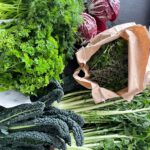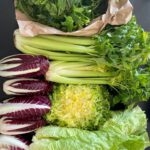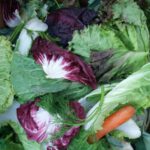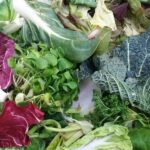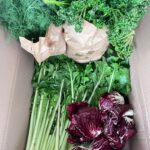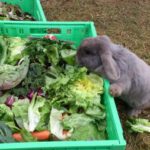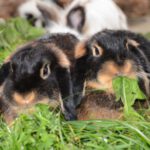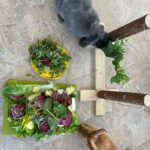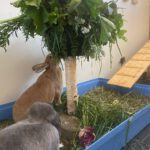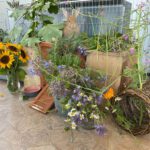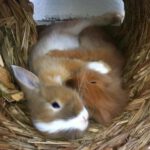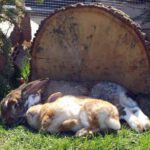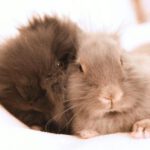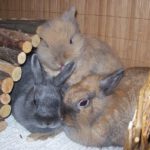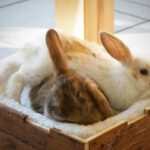Contents
- 1. Rabbits need fresh herbage
- 2. Freshly picked herbage is more suitable than from the supermarket
- 3. Rabbits require herbage 24/7 – food should be provided throughout day and night
- 4. Dry food should always be supplemented only
- 5. Commercial dry food may cause illnesses
- 6. Rabbits need secondary plant compounds
- 7. Offer water from a bowl instead of a ball bearing water bottle
- 8. Feed treats only in small amounts and don’t feed unhealthy snacks
- 9. Don’t be overcautious when feeding your rabbit(s)
- 10. Any change of food should happen slowly
1. Rabbits need fresh herbage
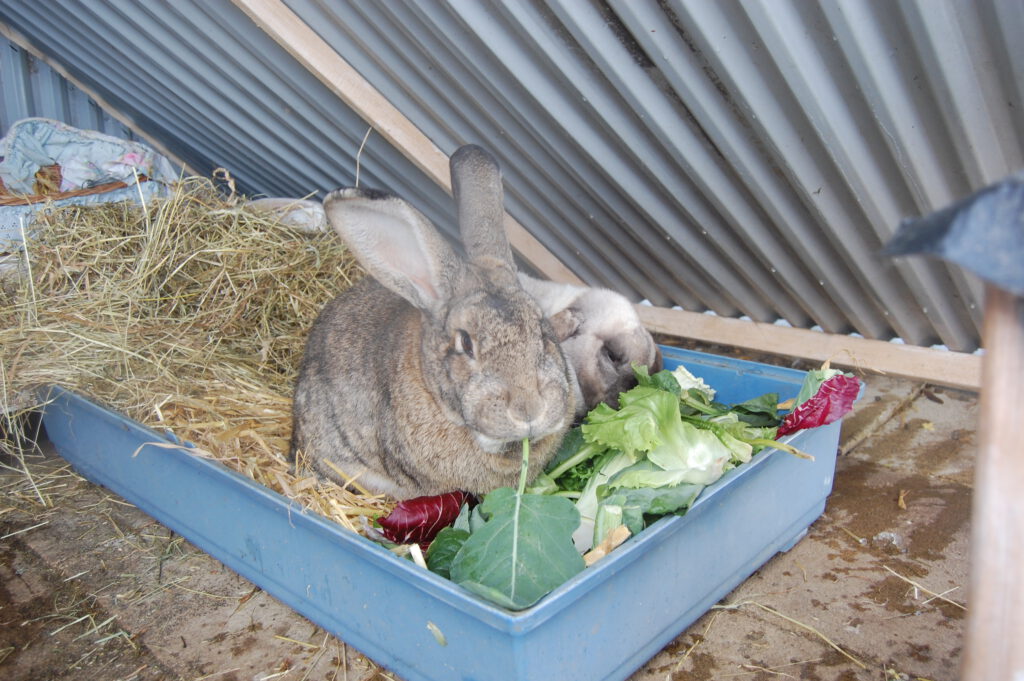
Neither dry food nor hay or (root) vegetables are suitable as the main part of a rabbit’s diet. Ideally, feed your rabbit twice a day a huge pile of fresh herbage. This includes various wild plants (meadow plants, broad leaves), vegetable greens (all cabbage varieties, carrot green, leaves from kohlrabi, spinach and other leafy vegetables) and all kitchen herbs.
If these rules are not adhered to, this may result in a slowed down metabolism and even digestive problems of various nature. Rabbits that are fed a mainly dry diet, are often not very active and fit and less vital. Even bladder and kidney diseases may consequently be developed. There is also an increased risk of dental problems.
2. Freshly picked herbage is more suitable than from the supermarket
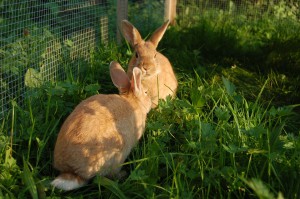
If you’ve got the opportunity to pick herbage yourself, seize this chance as vegetable greens are often less varied, less typical for the species and very often treated with pesticides. Picked herbage also contains more fibre and secondary plant substances, of which both are very important for your rabbit’s digestion and general health.
3. Rabbits require herbage 24/7 – food should be provided throughout day and night
It’s not sufficient to provide a little bit of herbage twice a day as rabbits require it day and night. Contrary to our habits, rabbits don’t feed in big meals but rather in many small portions. This spreads the load on the digestive system more evenly. Irregular feeding and hence varied loads in the digestive system (e portion of herbage and then only hay, etc.) can often lead to digestive problems. Another negative side effect is that rabbits will chew less (which may cause dental problems) and don’t take in enough water (which may cause illnesses of the urinary tract). The supply of nutrients may also be insufficient if rabbits are irregularly fed.
4. Dry food should always be supplemented only
Every dry food (whether it’s hay, dried herbs, roots or dried vegetables…) is always to be a supplementary food only and should never be the main part of the rabbit’s diet. If too much dry food is fed, rabbits who favour fresh food may become ill (diseases of the urinary tract, digestive problems, obesity, slow metabolism).
5. Commercial dry food may cause illnesses
Most of the dry food which you can buy from your pet shop can make your rabbit ill; even grainless dry food, veterinary food and premium varieties of dry food. It is advisable to swap to a health variety of dry food or even not to feed dry food at all (slowly reduce the amount throughout one or two weeks). A healthy dry food is e.g. ‚JR Farm Grainless Herbs‘ that you are able to buy online.
Healthy dry food should list all ingredients in the ingredient declaration, shouldn’t contain any by-products, and should only consist of herbs and seeds (perhaps even a little bit of dried vegetables). They shouldn’t contain any pellets (longish, green sticks) or extrudates (green or other colourful lumps, rings etc.) or wheat. Extrudates often consist of waste products and are very unhealthy for the digestion of your rabbit as they hardly show any structure anymore (usually they are milled products and don’t contain fibres anymore). Diets rich in dry foods often lead to a variety of digestive problems (including herbage intolerances), illnesses of the urinary tract and dental problems.
6. Rabbits need secondary plant compounds
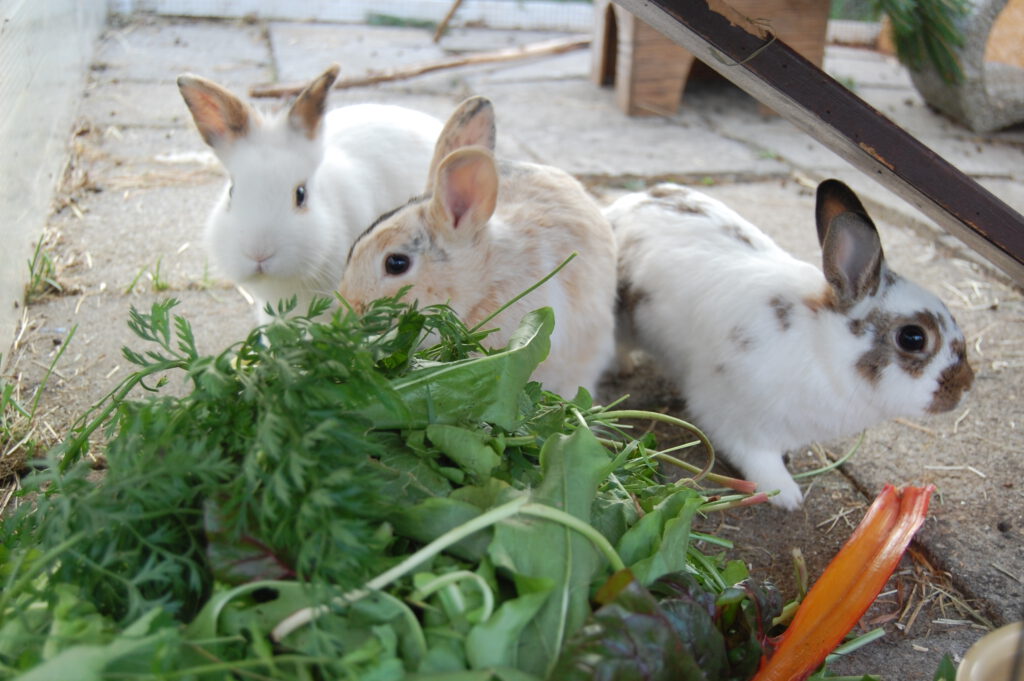
Secondary plant compounds play an important role for the health of your rabbit. Modern varieties of vegetables often don’t contain large amounts of secondary plant substances. Hence, it is very important that rabbits are fed with herbage (e.g. meadow plants) or that the vegetable greens are daily supplemented with dried or fresh herbs and twigs and branches from trees. Favour bitter tasting salads (endive, chicory, etc.), kitchen herbs and vegetables greens (carrot greens, celery green…). A lack of secondary plant compounds can lead to digestive disruptions and other illnesses (e.g. respiratory diseases).
7. Offer water from a bowl instead of a ball bearing water bottle
It has been proven that rabbits drink by far more from a bowl than from a bottle. This is why it’s imperative to provide water from a bowl. Water is also required all year round, even in winter and if your rabbits are fed with fresh food only. Illnesses of the urinary tract may otherwise be caused. In order for the bowl not to become contaminated, place it slightly raised, e.g. on top of a rock or the roof of a hideaway. Alternatively use bolt or hook on bowls which can be fixed to the wire of the hutches.
8. Feed treats only in small amounts and don’t feed unhealthy snacks
Unfortunately you find many unhealthy snacks when browsing your local pet shop which can be harmful for your rabbit. This includes rabbit drops, oat cushions, crunchies, rollinies and many of the other treats on offer. Equally popular but not harmful are pea flakes, foxtail millet (bird supplies), sunflower kernels and fresh herbs. Try not to feed dry treats in too big amounts and if possible hide them in a toy.
9. Don’t be overcautious when feeding your rabbit(s)
Unfortunately there are many outdated feeding tips that may rather harm than they’d benefit the rabbit. This includes for example ‚don’t feed wet fresh food‘, ‚eating cabbage causes flatulence‘, ‚don’t feed anything from nature as there are so many poisonous plants‘, ‚xyz is poisonous as it is poisonous for us/horses/dogs/cats or it is found on a list of poisonous plants‘, ‚cucumber causes diarrhoea‘ etc.
Especially rabbits which are fed following similar rules as above show often many illnesses. Rabbits which are fed a varied diet which isn’t overly cautious, are, however, often very healthy.
10. Any change of food should happen slowly
If you realise that the nutrition of your rabbit isn’t ideal, don’t rush the change of food. Rabbits don’t tolerate rapid changes from a mainly dry to a mainly fresh diet and vice versa. Reduce any pellet food to 1 table spoon a day and start feeding generally well tolerated fresh food by doubling the amount from one day to the next. Equally half the amount of hay each day. Once the rabbits have followed a healthy diet for a couple of weeks, cabbage, clover and similar plants can be added to their diet, too.




